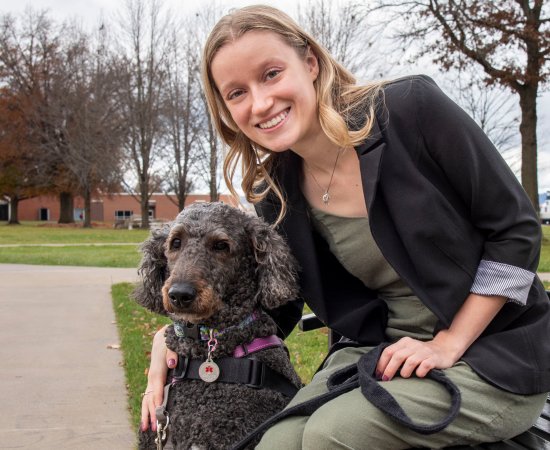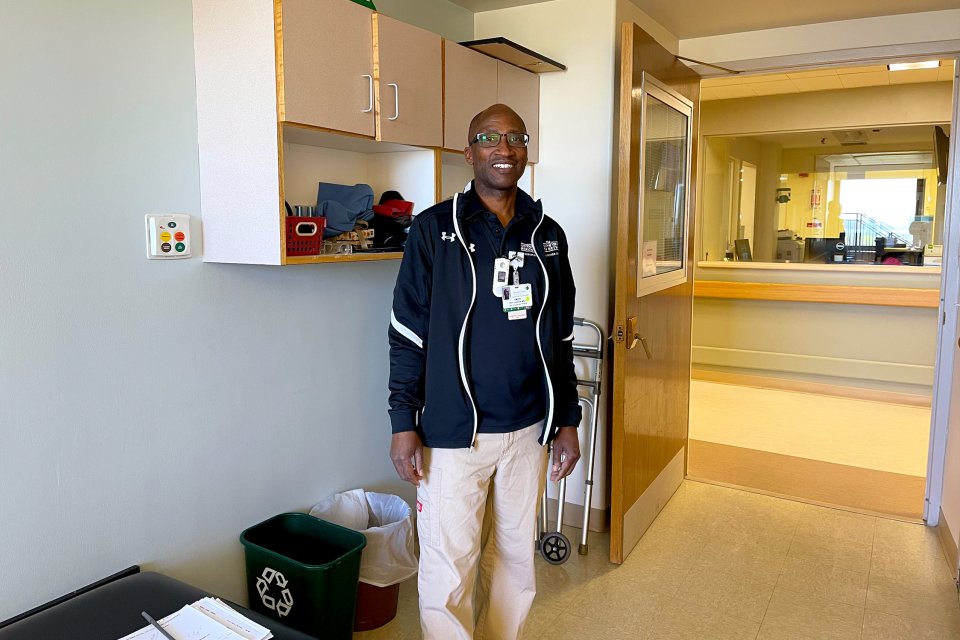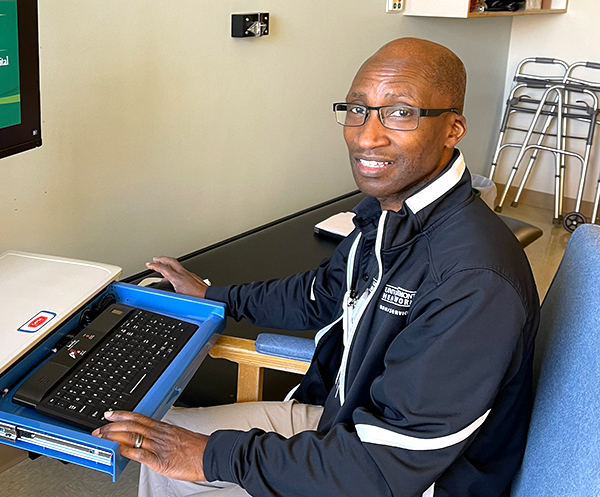
"Never had a thought of going anywhere else." - OT Doctoral Student Troy Canada G'08

Troy Canada G'08, M.S., O.T.R.
Since his earliest days, Troy Canada has believed that occupational therapy can make a real difference in people’s lives. Now, with more than twenty years of practice under his belt, he is pursuing his doctorate in OT through the new post-professional online program at Utica University. We caught up with him recently to talk about his experience as a therapist and his plans for the future.
Q: Tell us a little bit about your background. How did you get started in Occupational Therapy?
When I was a young kid, probably eleven or twelve, my mother had a stroke. She wound up getting occupational therapy and physical therapy. And I saw what the OTs did, as far as self-care stuff, to get her back to being a mother. When she was done working with therapy, she regained all of her function back, and I thought as a kid, that’s what I want to be when I grow up. I kept that in mind the whole way through, and as soon as I had the opportunity, I started that career path. It’s been a guiding force for me.
I did eight years active duty in the Air Force and twelve years in the Air National Guard, twenty years total. In the late 1990s I went back to school and got my BS in exercise science, then my associates in Occupational Therapy in 2001. After that, I enrolled in Utica’s OT Weekend program to get my masters. I’ve worked as a therapist at Champlain Valley Physicians Hospital in Plattsburg, NY for more than twenty years.
Q: So you’re an alumnus of the OT Weekend program. What was that like?
When I took the Weekend OT program, I was in the Guard, working full time as an OT assistant at the hospital, and going back to school on the weekend. Pretty busy time. And on top of that, I played semi-pro football, too. And we had a new baby, towards the end of the program. Looking back at it, I don’t even know how I did all of that.
The OT weekend program was every other weekend. It was the only way I could earn my masters degree, with everything else I had going on. My lifelong dream was to be an OT, and that program allowed me to do it. I had conversations with Paula Carey, the program director, in the beginning, and she helped me fulfill that dream. I graduated the OT Weekend program in 2008.
Q: What prompted you to pursue your doctorate at Utica?
A couple of years ago, I heard from one of the faculty members at Utica that they were starting a doctoral program. I was interested, but the pandemic hit, and so that sort of put a hold on everything. Then one day I was on Facebook and an advertisement for the doctoral program came up. So right away I got ahold of Professor Julie Bush at Utica, and she told me all about it.
I think familiarity with the institution was a big part of why I chose Utica’s program. Some of the professors I had for the Weekend program are still there. Everybody is helpful. As soon as the program was available, I jumped right on it. I never had a thought of going anywhere else.
Q: What has the OTD program been like for you?
The program is entirely online, and you can take it at your own pace. You can go as fast or as slow as you choose to. I’m taking the more aggressive approach. I’ve been taking all of the classes I could that were available each semester.
As a therapist, my drive all along has been to help people. If I didn’t have bills, I’d do it for free.
It turned out to be a good time for me to have the time to do it. I started out with taking a business course, that was my first elective, and an OT theory course. I’ve been averaging between two and three classes per semester. I’m just now winding down from this semester and I’m taking one class over the summer. My plan is to be done Spring of next year (2023). I will be one class short of graduating at the end of the fall semester, so I’ll have to take one more in the Spring.
Kyrra Marchese – we went to Utica for our masters together, and we’re in the doctoral program together as well. We’ve been taking the same classes, so she’s been helping to direct me. She’s a faculty member at Utica as well.
Q: How will this program help you achieve your professional goals?
Sometimes working in therapy you become a little stagnant, so this program has gotten me back to the underlying theory that makes up OT. It is helping me to refocus and get back to some of those foundations, so it’s been rewarding in that aspect. That was something I didn’t anticipate experiencing. The doctoral program has brought me a lot of knowledge that benefits my patients and allows me to help my colleagues as well – I share a lot of the things I learn with them.
Eventually I want to get into teaching. When I retire from working in the hospital, I want my next role to be as an Occupational Therapy professor. This degree will help me achieve that goal.
Q: What do you hope to achieve as an OT professor?
It will be a way for me to pay it forward. The therapists that worked with my mom paid it forward to me, and that resulted in me becoming a therapist. I hope I can bring other people into the profession as well by sharing my knowledge and experience, because you never know what kind of influence you can have. I don’t even remember the name of my mom’s therapist, and I’m sure the person doesn’t even know how much they influenced my life just from them doing their job. But it inspired me to be passionate about the people that I work with and the patients that I see.
I don’t take that for granted. That’s why every interaction that I have, in the back of my mind I do honestly think, okay, you don’t know how you’re going to impact this person. Make sure that you’re helping them reach their goal. And make it a positive interactive.

Q: What would you say to someone considering this program?
Every interaction, from financial aid, to the librarians, to the professors, everyone has been enthusiastic and helpful. I talk to people who have attended other institutions, and they don’t seem to have those same kinds of experiences. I have not had a bad interaction with anyone that I’ve come across at Utica. Everyone has been helpful, and seemed actually interested in helping me advance my career and my goals. If you choose this program, you can rest assured that you will have a lot of people in your corner who are going to help you be successful.
I think the flexibility of it is helpful, too. You can take it and go as quickly as you want or spread it out over years. If you wanted to take one or two courses per year, you could do that. Anyone looking to go back for their doctorate, that would be something to be aware of, because not all programs are like that. Some of them, you have a cohort, so you have more of a progression where once you start you have so long to get it done. This one is more flexible.
Q: Any final thoughts to share with us?
As a therapist, my drive all along has been to help people. If I didn’t have bills, I’d do it for free. It’s something I enjoy doing.
More Stories


Celebrating Utica University’s Class of 2025 at 76th Commencement Ceremonies

Utica University to confer honorary degree on Akira Armstrong ’05
I would like to see logins and resources for:
For a general list of frequently used logins, you can also visit our logins page.
